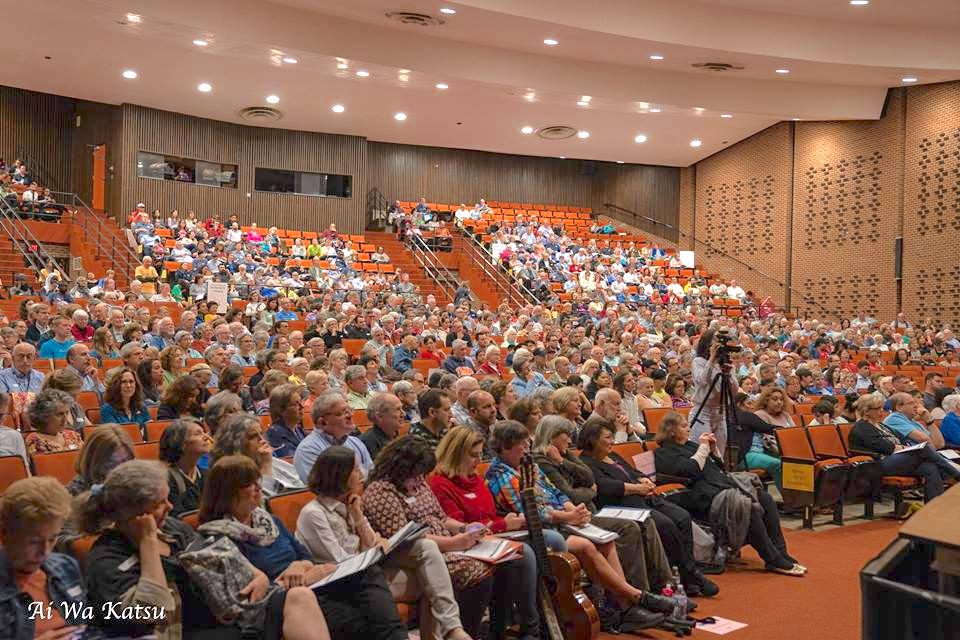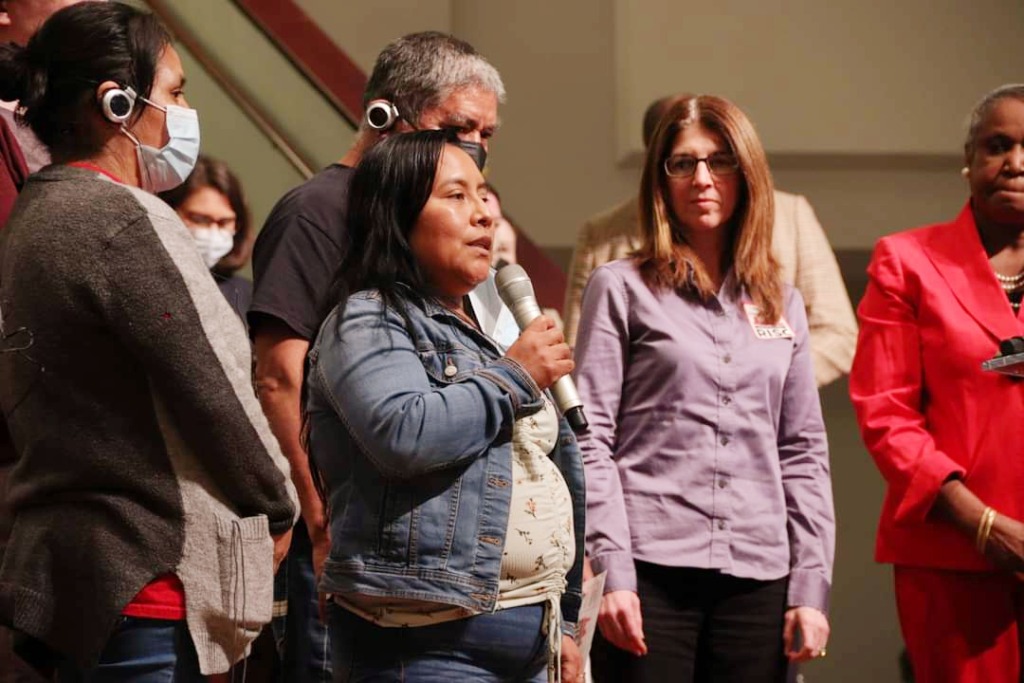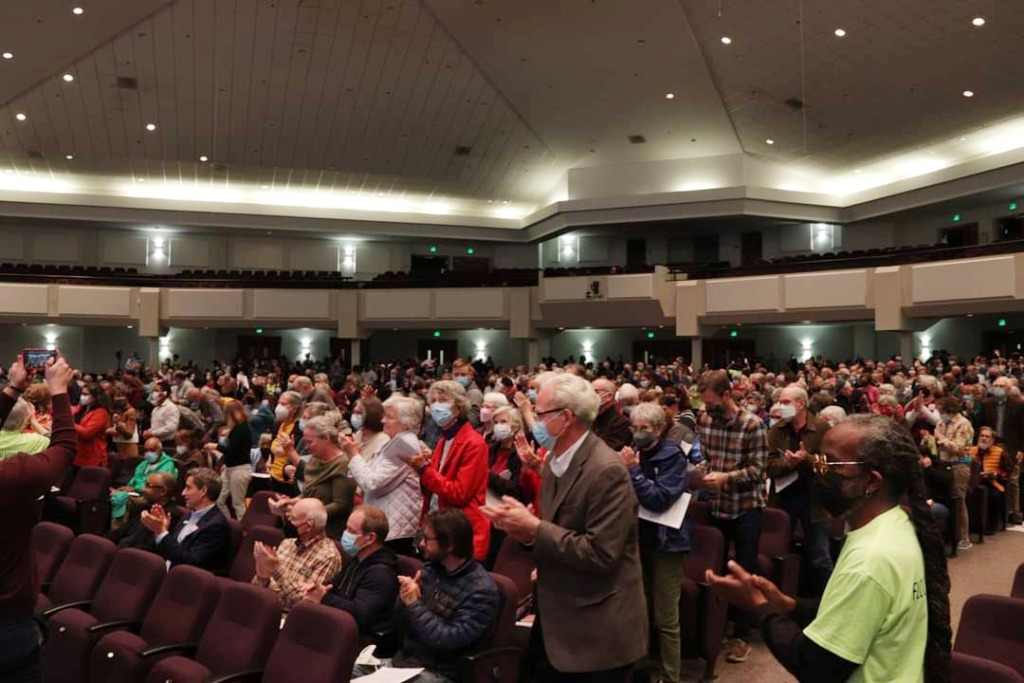IMPACT – Charlottesville
The mission of social justice group IMPACT is to bring together people of all faiths to change the world, one problem at a time. Its name stands for Interfaith Movement Promoting Action by Congregations Together.
Catholics, Protestants, Jews, Muslims, Buddhists, and those of other faiths meet throughout the year to not only identify issues facing the community, but to solve them.
The Charlottesville-based initiative’s annual Nehemiah Action assembly is where members of IMPACT and the general public meet with local government officials to openly express their concerns and propose ways to address them. This year’s assembly was held on March 21 at the city’s Martin Luther King Jr. Performing Arts Center. There, more than 1,000 voices formed a chorus appealing for access to early childhood education, affordable housing, and sustainable transportation.

IMPACT began in 2006 after leaders of local congregations joined forces to fight against the social injustices they witnessed. While most congregations had their own outreach programs, they realized they had a better chance of affecting lasting change by coming together as one.
Janie Pudhorodsky, who is a parishioner of Church of the Incarnation, Charlottesville, has been involved in IMPACT since its inception.
“Congregations had food banks, soup kitchens, clothing closets, and financial assistance programs. But the clergy and lay leaders realized they were not fixing the root causes of the problems,” she said.
“So they started meeting and asking what they could do to address the systemic change that was needed. That led to IMPACT,” Pudhorodsky explained.
Inspired by Nehemiah
Their annual Nehemiah Action assembly got its name from the Nehemiah found in the Bible, who helped rebuild the wall around Jerusalem. While there, he witnessed great injustices within society. Instead of trying to fight these wrongdoings alone, he gathered a large group of like-minded people who demanded change, and eventually received it.
Despite having religious roots, IMPACT’s website states, “Although our membership is drawn from faith-based institutions, our mission is not to push religious doctrine; IMPACT is a vehicle for people of faith to act on their call to do justice. Faith is our motivation, not our mission.”
Four-hundred Catholics attended the assembly, as well as hundreds of others from different faiths. Suzanne Bailey, parishioner of Charlottesville’s Holy Comforter Catholic Church and member of IMPACT since 2006, is comforted not only by her fellow Catholics supporting the cause, but by her fellow citizens.
“Jesus taught us to love God and to love our neighbor as ourselves. I think Catholics recognize that loving our neighbor requires that we stick our necks out for justice,” said Bailey.
“It is heartwarming to recognize that the love for a Creator and the love for our neighbor is a belief shared by all faith communities, even those who do not follow Jesus. It is an honor to be part of this ecumenical group,” she added.
The Nehemiah Action assembly is a culmination of several smaller interfaith gatherings held during the year. IMPACT meets with members of the community who tell them of their struggles. IMPACT then works to find realistic solutions by meeting with experts, as well as attending county board and city council meetings.
Improving the statistics
In Charlottesville, the cost of living is 110% of the national average, and 25% of residents live below the poverty line; hundreds of children and adults are homeless; 15% of students will not graduate high school; and many of the city’s youngest children do not have access to early childhood education.
Thanks in part to IMPACT, Charlottesville now offers a free dental clinic as part of the Charlottesville Free Clinic. Before the clinic was established, many in the community did not have access or could not afford dental care. Since its opening, the free dental clinic has helped thousands of patients.
Another significant victory for IMPACT was a women’s treatment center for those who struggle with substance abuse. The nearest treatment center was 70 miles away and the waitlist was exceedingly long. Even if beds were available, some women could not afford care, or were not able to bring their young children, making it impossible for them to get help they needed.
The Women’s Center at Moore’s Creek opened in 2018 and allows women to bring their preschool-aged children. More than 100 families have been helped through this center.
COVID had a significant impact on the community’s daily struggles; it’s reflected in this year’s foci on childcare, housing, and transportation. COVID saw an increase in childcare costs and waiting lists. Many parents, mostly women, were forced to quit their jobs or work from home. IMPACT is working to ensure all families have access to affordable childcare and early childhood education regardless of income.
Goals for the future
IMPACT would like Charlottesville to improve public transportation by lowering its carbon emissions. City councilors have agreed to work towards this goal over time. The hope is the Charlottesville Area Transit (CAT) bus line will hire a significant number of additional bus drivers to increase the efficiency of the service; this might lead to more people opting to travel by bus than by car, which will ripple again to reduce carbon emissions.
Affordable housing has been an ongoing goal of IMPACT for many years now. While previous efforts have resulted in hundreds of additional homes built, IMPACT is continuing to push for more.
Judy Zacharias, who has worked with IMPACT for 14 years and is a member of St. Thomas Aquinas University Parish, Charlottesville, explained that members of IMPACT met with the county housing policy manager, the city housing authority, and Habitat for Humanity to gain insight into how to best create more affordable housing.
Many residents are trying to balance soaring rent prices and stagnant salaries. The moratorium on evictions that was issued as part of government pandemic relief programs has now ended, and the root problems remain.
IMPACT proposes at least 3,000 new affordable homes be provided by 2030. IMPACT believes this goal can be reached if the city, county, and University of Virginia pool resources, as well as prioritize low-income families and seniors with the creation of an Affordable Housing Trust Fund.
At the Nehemiah Action assembly, city councilors agreed to direct more funding to building new homes, and county supervisors signaled their support for the Affordable Housing Trust Fund. Representatives from IMPACT will continue to meet with these leaders and attend county board meetings to ensure these funds are granted and homes are built.
IMPACT will continue to think globally and act locally.
“Start small,” said Bailey. “Instead of worrying about what you can’t do, find something you can do. Something as simple as showing up for a Nehemiah Action can make a difference in showing our public officials that the issues we present have broad support in the community.”
“By being one of many who show up, we can support our public officials in making the right choices for the common good,” she added.

Taking a RISC for Richmond
Richmonders Involved to Strengthen our Communities (RISC) held its own Nehemiah Action assembly on March 28 at St. Paul’s Baptist Church.
Much like IMPACT, RISC invites people from all backgrounds to join together to create change in the community. Hundreds attended the assembly and addressed local officials, asking for affordable housing, improved living conditions in mobile homes, and a decrease in gun violence.
“For nearly a decade, RISC has sought to improve the availability for everyone in Richmond to have a home because we understand that when people do not have a home or do not have secured housing, they live in constant fear of eviction,” explained Lance Nation, a RISC team leader.
“Their health and ability to participate in society diminishes. When people cannot pay rent, every aspect of their lives suffers,” he said.
Nation is a parishioner of Sacred Heart Catholic Church in the Manchester area of Richmond. The small Jesuit parish is attended by many immigrants; some have purchased dilapidated trailers because they were the only homes they could afford.

Some of these homeowners attended the Nehemiah Action assembly to tell their stories directly to public officials in a public setting, and it seems these firsthand accounts helped change some hearts and minds.
After hearing of the deplorable living conditions directly from those who live there, council members pledged to release the $300,000 that had already been allotted to the program last year, but which were never actually disbursed. RISC plans on meeting with these officials in the near future to make sure they stay true to their word.
RISC is also hopeful that Richmond will implement a Gun Violence Intervention (GVI) program that has proven successful in other Virginia cities, such as Hopewell. RISC has tried to garner support for this before to little avail.
For this assembly, several police officers from Hopewell attended and spoke of the lives saved thanks to this initiative. While RISC received no promise of GVI implementation, they will continue pushing for the program.
“We all band together in a mission-motivated mindset and we listen and explore all options to address these campaign issues,” said Nation. “While passions are high, and this is intense and difficult work, our desire to see change displaces any internal trouble because we realize this work is more important than any one person.”
Nation explained that RISC doesn’t represent any one person or one faith, but one Richmond, made up of various religious, socioeconomic, political, and ethnic backgrounds, but all sharing a common goal.
Of his time with RISC and his growing relationships with people of different religions, Nation said, “The more I experience the faith of others, the stronger my faith becomes. I learn of our shared hope, and the visions, my hope, of His Kingdom here become strikingly more beautiful.”
Editor’s note:

